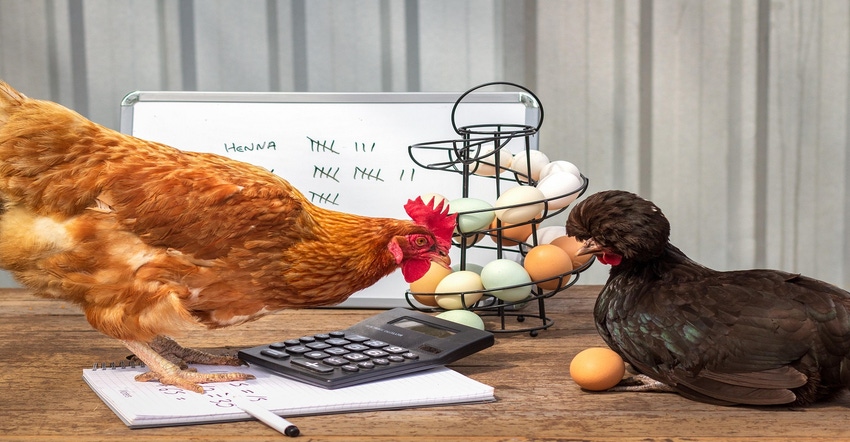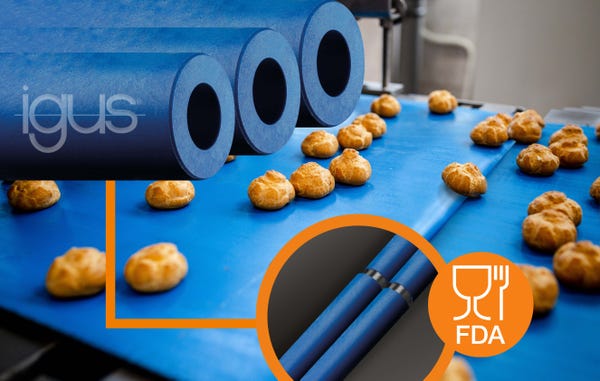How to Build a Better Food & Beverage System with Non-Corrosive Bearings
Components in food & beverage must be non-corrosive while also able to withstand extreme conditions.
December 6, 2021

Food & beverage production requires specialized equipment that can hold up to high and low temperatures associated with ovens and bottle cleaning. Plus, the machines and equipment must be clean, corrosion-resistant, and lubrication-free. Increasingly, plastic and maintenance-free solutions are proving to be the right choice.
Lubrication-free linear guide systems are being used in numerous applications in the food & beverage industry due to their wide range of performance, whether it is in beverage filling systems or bottle processing. Other challenges include dusty environments such as flour processing where sparks can also lead to dust explosions. These sparks can take the form of small arcs that occur when moving machine parts do not have an electrically dissipative design.

Food & beverage production often requires extremely high speeds. In these conditions, the packaging mechanisms, especially bearings, are subjected to wear. Equipment manufacturers need to help end-users determine when the equipment is worn to the point of failure.
We caught up with John Nebbia, industry manager for Food and Beverage Processing at igus, to explain how a bearing manufacturer meets the challenges of food & beverage production.
Design News: What are the important issues in preparing bearings for use in food & beverage production?
John Nebbia: It all ties back to sanitary design and not having lubricants in the system. Those who need to grease their systems end up creating downtime, and downtime in food & beverage costs a lot of money. Sanitary procedures cost a lot. We have bearing components that don’t need maintenance. It’s part of the goal of creating as little downtime as possible, whether we’re doing bottle a minute or 600 bottles a minute.
DN: What is the role of regulations in food & beverage production?
John Nebbia: A lot of the time, our products must be FDA compliant. Grease-free components help. Other companies need to use external grease which can also be FDA compliant but still risks contaminating the product. Additionally, due to the nature of food processing, a lot of equipment needs to endure washdown with harsh chemicals. This is where having an inert product, and non-reactive is key. Igus also uses softer and more corrosion-resistant grades of stainless steel than many of our competitors which only helps us withstand these environments.
DN: What are the equipment requirements in food & beverage operations?
John Nebbia: Food and beverage production has different types of design, from conveyors to cartoners and palletizers. For beverage we have seen success in bottling equipment for areas of washing, filling, capping, and palletizing. We’ve been involved in all of it. The linear stroke on a screw capper uses our linear bearing. We have also seen a growing demand for increased flexibility and functionality when working with our customers this means more format adjustments to be able to run a wider variety of products on the same line.
A lot of times we work with the machine designer upfront. They will give us the information on their machines. We also work with the integrators and end-users. In the last year, we’ve added more robotic compatibility as well Our products play well with industry leaders such as Allen Bradley and Siemens. A majority of our customers use those products, but we have worked with others as well.
DN: Is temperature range a big issue in food & beverage?
John Nebbia: We have to work with a range in temperatures. That includes cold process foods and flash freezers on up to continuous use at 482-degrees Fahrenheit or higher for flash ovens and short-term exposures. We must cover low to high temperatures. Our products are created and tested for those extremes. We have FDA materials that can operate in these extremes as well.
DN: Are there downtime considerations in preparing components for food & beverage?
John Nebbia: Yes, have products that alert users when maintenance is required. We produce smart plastics where we print a circuit into a bearing, and it delivers a go/no-go signal based on the sensors inside the bearing. Smart components make sense in food packaging since the cost of downtime is so high.
Our 3D Print Service which is new for us over the last few years can turn around a Custom SLS part in days while meeting FDA regulations if needed. That’s huge in avoiding downtime for our customers.
About the Author(s)
You May Also Like


.jpg?width=300&auto=webp&quality=80&disable=upscale)


